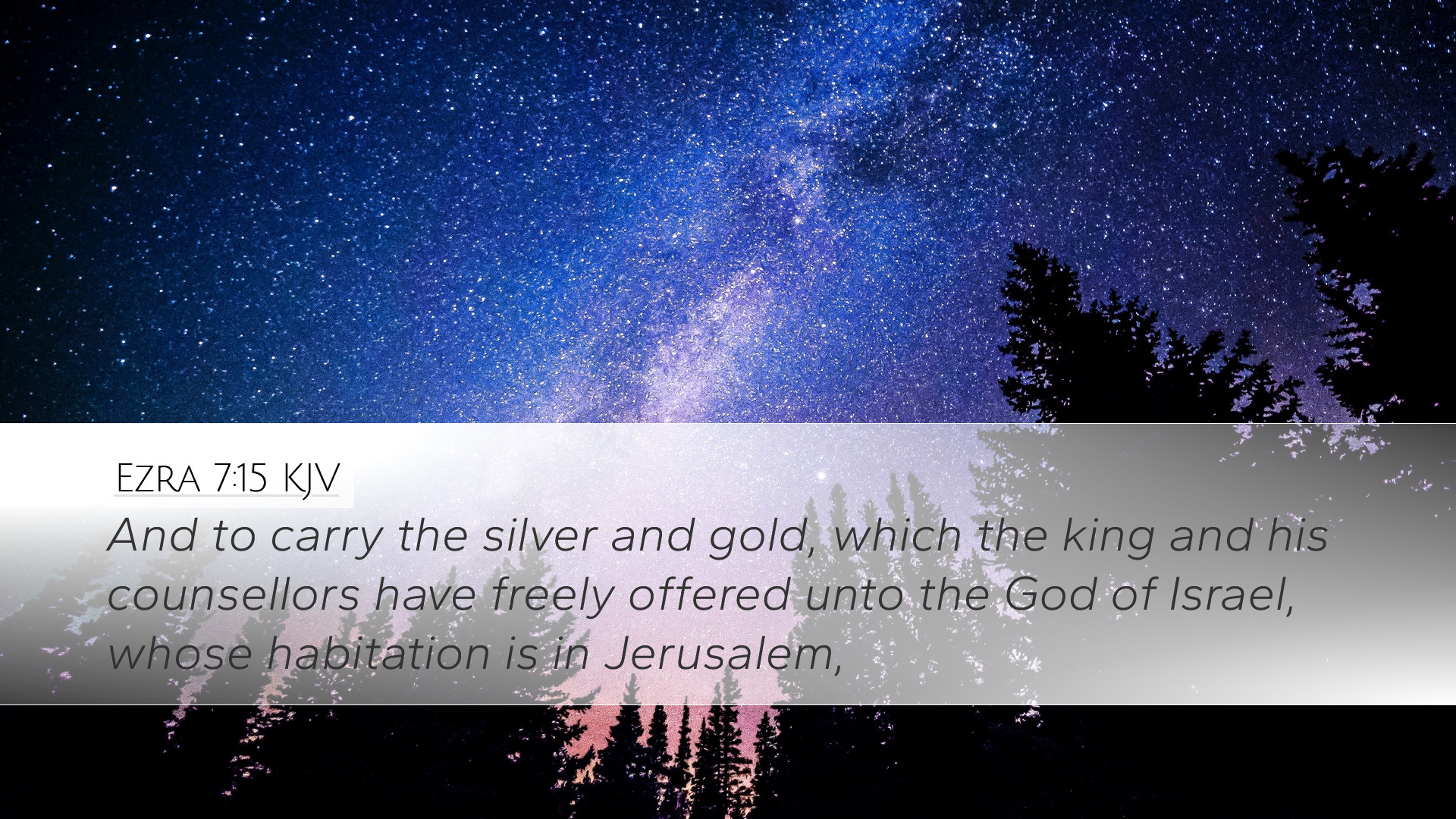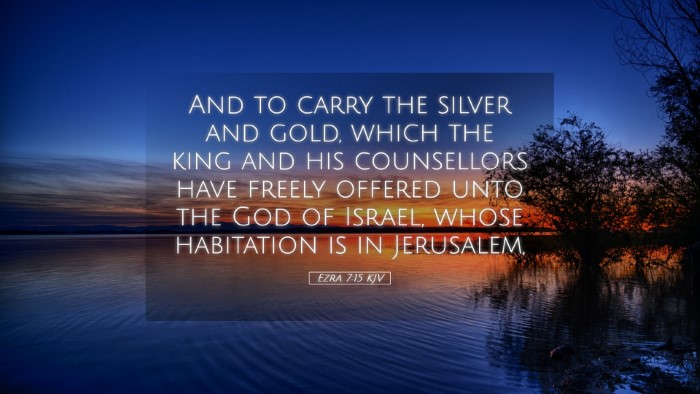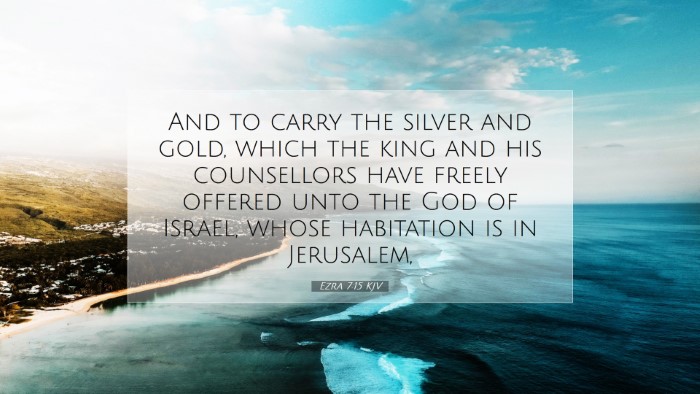Old Testament
Genesis Exodus Leviticus Numbers Deuteronomy Joshua Judges Ruth 1 Samuel 2 Samuel 1 Kings 2 Kings 1 Chronicles 2 Chronicles Ezra Nehemiah Esther Job Psalms Proverbs Ecclesiastes Song of Solomon Isaiah Jeremiah Lamentations Ezekiel Daniel Hosea Joel Amos Obadiah Jonah Micah Nahum Habakkuk Zephaniah Haggai Zechariah MalachiEzra 7:15
Ezra 7:15 KJV
And to carry the silver and gold, which the king and his counsellors have freely offered unto the God of Israel, whose habitation is in Jerusalem,
Ezra 7:15 Bible Commentary
Commentary on Ezra 7:15
Ezra 7:15 states:
"And to carry the silver and gold, which the king and his counselors have freely offered unto the God of Israel, whose habitation is in Jerusalem."
Introduction
This verse signifies a pivotal moment in the narrative of Ezra's mission to restore the community in Jerusalem. The context reveals the profound relationship between the Persian king and the Jewish people, as well as the divine endorsement of Ezra's mission. In examining Ezra 7:15, we draw upon the insights of notable biblical commentators like Matthew Henry, Albert Barnes, and Adam Clarke to encourage a deeper understanding of its implications for faith and community restoration.
The Significance of Silver and Gold
The mention of silver and gold carries significant weight in the narrative:
- Divine Provision: As highlighted by Matthew Henry, the offering of precious metals for the temple signifies God's provision for His people. The resources provided by King Artaxerxes and his counselors illustrate that God influences even secular powers to fulfill His will.
- Intent for Worship: Albert Barnes emphasizes that the gold and silver were intended for the worship and service of God—that is, for offerings, sacrifices, and the maintenance of the temple. This reflects the understanding that all resources ultimately belong to God and should be directed towards honoring Him.
- Restorative Mission: Adam Clarke notes that Ezra’s undertaking is not merely administrative but restorative. The contributions signify the rebuilding of the spiritual and physical aspects of worship in Jerusalem.
The Role of Ezra
Ezra's appointment as a leader and priest in this context cannot be overlooked:
- Providential Leadership: Ezra’s selection for this mission showcases God’s providential hand in raising leaders who respond to the needs of His people. According to Henry, the character of Ezra as a scribe and priest exemplifies zeal for God's law and a commitment to teaching it.
- Model for Modern Ministry: Barnes suggests that Ezra serves as a model for contemporary pastors and theologians—a leader grounded in Scripture and committed to reforming the worship of God in accordance with His commandments.
The Theological Implications
At a theological level, this verse illustrates several key themes:
- God’s Sovereignty: The ability of the king to give freely underscores God’s sovereignty over earthly kingdoms. This is a recurring theme in Scripture, reminding believers that God's plans prevail irrespective of human authority.
- Worship and Service: The materials being sent highlight the importance of worship in the life of believers. Clarke notes that financial contributions have always been central to sustaining the worship of God, which remains applicable to present-day faith communities.
- Unity Among Believers: As resources are mobilized for a common purpose, the collective effort serves as a reminder of the unity among those who serve the Lord, an important aspect noted by both Henry and Barnes. This communal effort reinforces the significance of partnership and collaboration in ministry.
The Historical Context
Understanding the historical backdrop of Ezra 7 illuminates the importance of this mission:
- Restoration After Exile: The return to Jerusalem from Babylonian exile represents a significant event in Israel’s history—one of restoration, renewal, and recommitment to God following years of spiritual desolation. Henry addresses the importance of this return, linking it to God's enduring covenant with Israel.
- Influence of Persian Rule: The role of King Artaxerxes reflects how foreign rulers can be instruments of God's blessing. This has implications for understanding how God operates through secular authorities for the sake of His people, a point that Barnes explores in detail.
Practical Applications
The reflections on Ezra 7:15 also yield practical insights for today’s church and individual believers:
- Faith and Finances: Believers are called to view their financial resources as tools for kingdom work. Just as King Artaxerxes contributed, so too should modern Christians fully engage with their resources for ministry, reflecting a generous spirit in response to God's grace.
- Leadership and Vision: The example of Ezra prompts church leaders today to embody a vision rooted in Scripture, prioritizing spiritual renewal and education as central to their ministry. Clarke's insights invite contemporary leaders to rekindle a passion for teaching the Word.
- Trusting in God’s Plan: This verse encourages all believers to trust that God orchestrates all circumstances for His glory, and they can take courage in their own missions, knowing that God uses even unlikely sources to advance His purposes.
Conclusion
Ezra 7:15 stands as an enduring testament to the ways in which God provides for His people through unexpected avenues. It encourages a lens of faith through which both pastors and scholars may view the workings of God in history, worship, and community. As they reflect upon the profound interplay of divine providence and human action in this mission, they are reminded to pursue a life committed to the service of God with the resources He provides.


